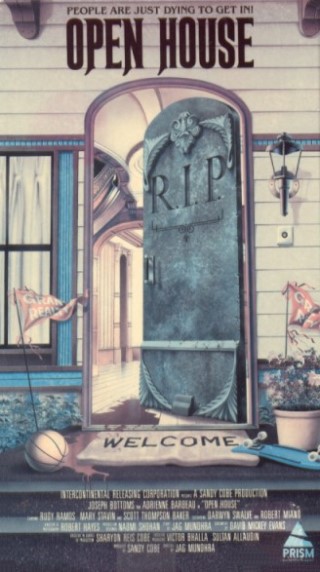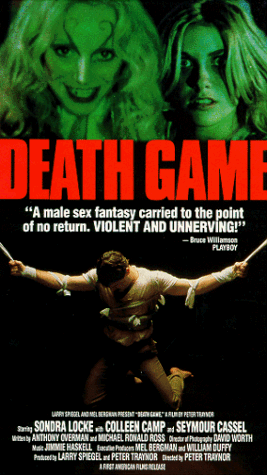 Man, you know how it is. You're sitting alone at home on a rainy San Francisco night. The wife and kids are out of town so you're just kicking back, listening to some of your favorite records on your impressive stereo system, eating some pizza, enjoying a quiet 40th birthday solo. Then there's a knock at the door - turns out to be two young ladies need to use the phone. They're drenched to the bone and seem harmless enough, so of course you invite them in, get them some towels, feed them hot chocolate, allow them to dry off by the fire and wait for their ride.
Man, you know how it is. You're sitting alone at home on a rainy San Francisco night. The wife and kids are out of town so you're just kicking back, listening to some of your favorite records on your impressive stereo system, eating some pizza, enjoying a quiet 40th birthday solo. Then there's a knock at the door - turns out to be two young ladies need to use the phone. They're drenched to the bone and seem harmless enough, so of course you invite them in, get them some towels, feed them hot chocolate, allow them to dry off by the fire and wait for their ride.
Maybe one thing leads to another and you walk in on these couple of gals making like mermaids, splashing around naked in your oversized bathtub. They seem enthusiastic to get you involved. One of them is impish and curvy with cute chubby cheeks, the other is... not terrible looking. The point is, threesome! Delivered right to your doorstep! While the cat's away! Who are you to turn it down?
That's probably the exact thought running through your head 24 hours later when you've been tied to your own couch, your home ripped to shreds, there's a dead grocer sticking out of your fish tank and you're scheduled for beheading at dawn.
Such is the ordeal of one George Manning, played by Seymour Cassel, Mr. In the Soup, Dirt from friggin' Beer League, ol' Moskowitz himself. His wife, Beth Brickell, has left to go visit Gentle Ben following a frisky game of croquet, but not before assuring him that she "wouldn't trade my life with you for anything." If the marriage has any blemishes, they're buried deep under gentle titters and the occasional conk of croquet balls, a wholesome scene right off the cover of Genesis' Nursery Cryme.
But like everything that comes after the innoucous croquet game in album opener "The Musical Box," the rest of the movie following Brickell's departure is centered around sexual humiliation and murder. Left alone at home, George is visited by Jackson and Donna ("Sounds like a Vaudeville team," the terminally square George opines), two seemingly airheaded young ladies who got lost on their way to a party. George plays the concerned father - he has a daughter himself - but can't help showing off his record collection in an attempt at being hip. Confessing that he received "nothing new" for his 40th birthday, he seems to hint that he'd be up for something adventurous as he tries not to leer at coquettish Donna tussling around on the floor with her friend, offering brief flashes of her undergarments. And sure enough, a little seduction in what Jackson refers to as the "sand box" proves irresistible and George steers toward the rocks of these two Sirens, feebly mumuring "I'm a happily married... man..." as they draw him into the sauna.
At its most successful, Death Game is essentially a porno movie gone horribly wrong. The bathtub ménage à trois is even scored like your standard 70's skin flick, just a wah-wah pedal away from Debbie Does Dallas territory. The scene's soft dissolves and arty close-ups of entangled flesh are straight out of Radley Metzger, with George being initiated into a little liberated fluid-exchange a'la Marilyn Chambers' socialite in Behind the Green Door, which was also set in swingin' San Francisco. A shot from the spicy montage was even used for the revamped video art when the movie was apparently re-marketed under the title The Seducers (although it was the original box that intrigued me to seek out this oddity, I ended up purchasing the second edition, complete with a spliced-in "The Seducers" title in a cheap font that looks nothing like the rest of the credits).
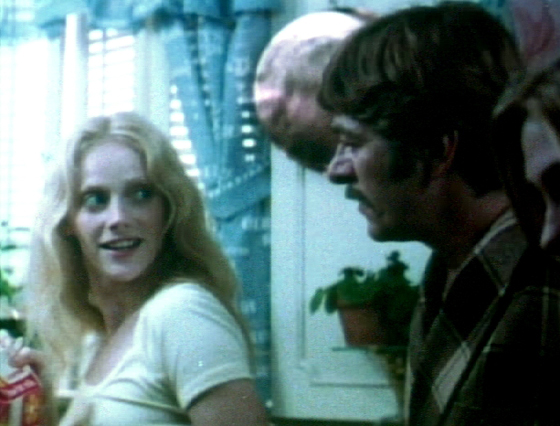
Effortlessly scoring two zesty lasses is the basic scenario for any prosaic slice of cinematic erotica, but by the time the steam has evaporated from the sand box walls George's fantasy will have gone from Rinse Dream to Drenched Nightmare. The next morning George makes his way downstairs in his flannel bathrobe to find that his nocturnal guests have failed to vacate the premises. In reparation for their breach of post-coital protocol they've whipped up some pancakes, so George sits back and lets this mock-breakfast sketch play out as he nervously tugs on his wedding ring. The meal becomes excessively awkward as the girls slather on syrup and shove flapjacks in their mouths without touching the utensils. Jackson has some bawdy business with a banana that makes George even more uncomfortable, and instead of packing a doggy bag and hitting the seven hills of San Francisco the girls head upstairs, where Donna tries on his wife's negligee while Jackson roams around peeking inside closets and drawers. Things have certainly progressed past the porno's natural fade out.
George threatens to call the cops but Jackson stays his hand, announcing that his illicit tryst of the previous eve involved a 15- and 17-year old, respectively. Police involvement would mean exposure and possible jail time for him. The perturbed homeowner waffles, ultimately choosing a ride to the bus station over a statutory rape charge, and endures more obnoxious behavior from the back seat ("I'm tired of this gum - will you throw it out for me?") for the length of time it takes to dump his teasing houseguests at the Greyhound. "It's been a little bit of heaven," Jackson offers as George pulls away without looking back. Having dodged a bullet, George heads for work. Sitting at his desk, he looks distractedly out over the bay, a tinge of remorse fused with a gleam of relief washing over his face as the song from the opening credits returns to play over the slowly dissipating cityscape. The end?
Well, it's the end of the movie being interesting. The next scene in which George returns home to find that Jackson and Donna have let themselves back in and they knock him out, tie him up and start trashing the bedroom is pretty much what we've got to look forward to ad nauseam for the remainder of the running time. A cat and mouse game where the two cats seem little more than restless and the mouse is already dead. The pancake duo are played by Sondra Locke (Jackson) and Colleen Camp (Donna), and they do the best they can to appear menacing and creepy but the whole thing reeks of wasted effort. Locke and Camp (sounds like a hardware store) are much more sinister when they're stuffing their mouth with scrambled eggs and sorting through their host's personal belongings - the idea of these two nondescript nymphettes out of a blue movie who simply refuse to stop existing after their arbitrary function is a great idea, kind of like The Cable Guy if it were the dark, twisted horror movie that it should have been (Mark Romanek was slightly more successful, though not entirely, with One Hour Photo). The initial trepidation that they might stick around long enough to threaten George's stable household rising serially into full-blown panic that these unbalanced ladies might never leave at all is a twist that could have worked, especially if Roman Polanski were directing and starring in the movie. But once it comes time for them to seem like a genuine threat, shrieking and breaking vases and staging an impromptu trial in George's living room, the movie's weak hand is revealed; at best what we've got left is a mildly diverting one-act play.
Languidly failing to reach the high tension of The Desperate Hours (or even the more strained moments in the third act of Home Alone), Death Game drops into the low-tier of home invasion movies along with Oliver Stone's Seizure, Ruggero Deodato's The House on the Edge of the Park and, more recently, the substandard You're Next. Frustratingly, it hints at the future greatness of Haneke's Funny Games: at one point, Donna calls Jackson by a different name - "Agatha" - suggesting obvious aliases, they let George think he's gained control only to wrest it back and, in the middle of the movie, they appear to leave yet quickly return and continue their "game." They also kill the family pet. But mostly what they get up to is kooky shit. Locke stuffs flowers down the front of her blouse. Donna pounds on piano keys. They pour milk, flour and tomatoes on top of an unconscious George from the second floor. They eat popcorn and gargle with mouthwash. In one of their more unforgivable acts, they spill some ketchup on the tablecloth, a shot which is held for an oddly long amount of time with weird disjointed music playing over it, almost like an intermission. By the time they actually turn violent, macing George and tethering him to the bed, murdering a grocery delivery boy and threatening to do the same to their host, we're just fed up with their antics. Although, it's kind of shocking that the croquet mallets don't return. This movie could have beaten The Shining as the first horror movie to introduce heavy croquet mallets being used on skulls and kneecaps (that is, if Kubrick hadn't wisely changed Jack Torrance's weapon of choice to an axe).
The movie opens with the following disclosure over a shot of the Golden Gate Bridge:
"This motion picture is based on a true story. It should serve to remind us that fate allows no man to insulate himself against the evil which pervades our society."*
As if to corroborate the statment's authenticity, the movie then identifies the date as October 10, 1975. (What do you know, 40 years ago! George turns 40 in the movie, now the date of the fake-crime turns 40. Sunrise, sunset.) And just to further validate it, the summary on the back of the video box claims what you're about to see is "so bizarre it's hard to believe this motion picture is based on a true story. But it is." If you say so guys, although I couldn't pull up anything on this alleged seduction-slash-home invasion. Mid-70's, the city was still reeling from the high-profile "Zodiac" killing spree from the turn of the decade - many unsolved murders throughout San Francisco at that time were still being attributed to Zodiac (mainly by noted hack Robert Graysmith). From '73 to '74 there was a serial killer hyped as "The Doodler" who would sketch on the skins of men he picked up from clubs and murdered after sex. There were the racially-motived "Zebra" murders carried out by a group of Black Muslims from October 1973 to April 1974. The San Francisco press sure loved their cute nicknames for brutal murderers, but I can't recall hearing about the "Threesome Invasion" or "Pancake Massacre" anywhere.
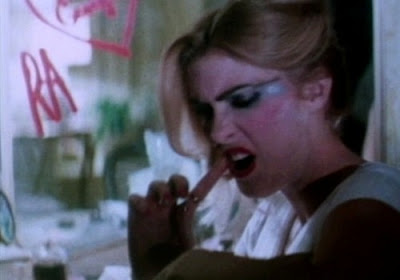
More likely, the idea for the film was culled from the "deadly female hippy home invader" profile made famous by the Manson Family murders and the notoriety of San Francisco's own popular outlaw Patty Hearst. "We're on the road, George," Jackson says at one point, suggesting that she and Donna are driftless runaways in the style of Leslie Van Houten or Susan Atkins - and despite her lack of beads and headband, her appraisal of several articles in George's house as being "far out" seems to confirm her hippiedom. "The dark side of flower children" is definitely on the movie's mind, based on the shot of a topless Donna flashing a "peace sign" at captive George but mouthing "two more hours" to show she's actually indicating the time remaining until his impending execution. The society-pervading evil the opening crawl warns against was based on the trendy paranoia of stand-up citizens afraid to allow lawlessness and irresponsibility into their homes which could only result in destruction. Even with the benefit of free love, don't let these freaks in! They'll trash your house! They'll eat all your food! And when they want more food they'll order some, and then kill the delivery book when he brings it! If you have a baby lying around and they get what's called "the munchies," they'll put it in the microwave!
Also hazily put forward in the film (but hardly followed up on) is the idea that your own independent daughter could return as an unstable vagrant to destroy the very home that fostered her. That slant was undoubtedly informed by Patty Hearst, whose involvement in bank robberies and attacks on police in and around San Francisco until her arrest in September 1975 was attributed to brainwashing by the SLA that turned her from a high society heiress into a counter-revolutionary. Following the return to the house and shackling of George, Donna starts calling him "daddy" as she climbs over his subdued form, slapping his face uncontrollably and lewdly flashing him after Jackson suggests they play dress-up with his wife's clothes. "Stop it! Don't do that!" become George's futile cries whenever the girls decide to rip up clothes or shatter a vase or brain a grocer with the fire poker and drown him in the fish tank. Donna provides a flimsy narrative of her childhood, speaking to George in place of her father/stepfather, that hints at possible incest and/or rape ("Since the day mama brought you home I loved you, daddy...") That the pair's motive is based on punishing George for his hypocritical rejection of them following their intimate night together is thereby linked to a father's expulsion of his daughter into the cruel world, from which she may return adversely "changed."
Which would be fine if the film had any real commitment to honestly exploring these issues rather than just floating around a vague feminist revenge angle. There's a real laziness to the second half of the movie, evident in the monotonous location, boring set design, uninspired camerawork and the apparent disinterest of Seymour Cassel who, it should be mentioned, is dubbed throughout the movie and then seems to merely give up reading lines at some point. But mainly the director appears to lose interest in reminding us why fate chose this particular man to be victimized by these two women, other than the basic "killer hippies wreck insular man's home" plot. For his part, George doesn't seem particularly insular: he's just hanging out at his house, a modest residence in suburban San Francisco, waiting for his wife and kids to get home. Just a fuddy duddy who's let himself go to the extent that he can't physically overpower one dainty blonde and her unfocused companion. How did the invaders even know that his would be right door on which to knock, on a rainy night when they're looking specifically for a man with loose morals whose family are all conveniently out of town? If the duo are targeting George as a representative of unfaithful husbands everywhere, you have to wonder what their reaction would have been if he'd held fast, claimed to love his wife and immediately asked them both to leave. Would they still go through with their "game?"
No, I think we're back to Manson Girl-type psychos, because for all the backstory of traumatizing sexual abuse these girls aren't reliable. They lie to gain access to the house, pretend to leave only to return, Donna calls Jackson by a different name and their claim to be underage isn't believable, even to George - when the movie was shot Camp was still in her early 20's, but Locke was over 30 and doesn't for a second look "17." Donna's memories of seducing her own (step?)father, whether she's communicating a confused history of sexual assault or not, are related in the same mocking tone she's been using to insist that George is her new boyfriend - who knows if there's truth to any of it? Even a shot of seductress Jackson chomping on an apple is undermined by a reverse on Donna suggestively poking at... a bagel. Mrs. Davidovich, you're trying to seduce me!
The role-playing is something that could have been a lot more weird and interesting, if the movie cared about it at all. In the course of emasculating their victim, imperious Jackson dons a magician's tux/top hat ensemble and frolicsome Donna a breezy nightgown and they share a romantic slow dance. With Locke dressed like a man, you could see how this would have worked as an assumed role variety of horror film. I thought it would be going in that direction based on the song played at the beginning of (and many more times throughout) the film. We here at Video Oddities, Inc. have been enthralled by songs that range from the delightful cheesiness of Jon Anderson's "Christie" to the unmitigated awesomeness of Loïs Lane's "Amsterdamned." Sadly, Game Death's ukulele-heavy novelty song "Good Old Dad" doesn't measure up to the high standards set by its predecessors. It's grating as it plays over the opening credits and just gets worse the next 3 or 4 times we hear it in the movie and again in the closing credits. It rivals the Burt Bacharach-Hal David theme song from After the Fox as the most obnoxious song ever recorded for use in a film. But as an ode to a dad who'll "walk the straight and narrow path" and "spank my bottom when I'm bad," it seems to be setting up an ironic portrait of bitter "children" who return and vanquish their "dear old dad." Really, the movie should have ended with George looking like Commissioner Gordon at the end of The Killing Joke.**
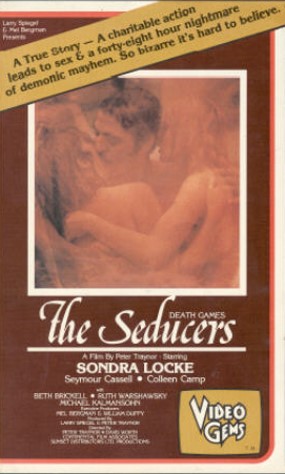 This may be the first Video Oddities where the addendum might actually be longer than the article itself. I couldn't think of much to say about the film but there's some interesting stuff I found out after watching it, including a really, really strange fluke I only just discovered.
This may be the first Video Oddities where the addendum might actually be longer than the article itself. I couldn't think of much to say about the film but there's some interesting stuff I found out after watching it, including a really, really strange fluke I only just discovered.
The original title of the movie, which was shot in a home in Hancock Park in Los Angeles, was Mr. Manning's Weekend. It was released as Death Game in 1977, then re-released in the early 80's on video under the new title The Seducers. In 1978, Colleen Camp co-starred in the American version of Game of Death. Five years later, she'd pop up in a movie called The Seduction, David Schmoeller's follow-up to Tourist Trap, for which she received a Razzie nomination for Worst Supporting Actress. No news on when she'll appear in a movie called The Seduction Game.
Previously, director Peter S. Traynor had produced Steel Arena and Truck Stop Women for Mark L. Lester. He co-directed only one other film, the zombie horror flick Evil Town, filmed in the late 70's but not released on video until 1987. Four directors are listed on Evil Town, including Death Game producer Larry Spiegel and Curtis Hanson, credited under a pseudonym.
In her 1997 autobiography The Good, the Bad and the Very Ugly (she should have called it Un-Locked), Locke claims she ended up largely directing her own performance, as well as Camp's, in light of Traynor's lack of leadership. Not surprisingly, she states that Cassel was "so disgusted that every day he threatened to walk off set and never come back." Cameraman/editor David Worth ended up dubbing the lead actor, since Cassel refused to come back for looping. Worth served as DP for Bronco Billy and Any Which Way You Can (recommended by Locke to Eastwood?) He would go on to direct Kickboxer.
Locke further writes:
"The director didn't have any idea what he needed to be, was, or should be doing. He knew nothing. He was handsome, charming, and dressed in nifty clothes with the obligatory gold chain around his tanned neck; 'Hey, moviemaking's a learning experience,' he'd say, always spraying his spittle as he spoke. He would be perfect casting, I thought, for a con man with shady associations, which is exactly what he turned out to be."
According to Locke, Peter Traynor's directions were limited to asking her and Camp to "break something or eat something." Honestly, that sounds like pretty good directing to me.
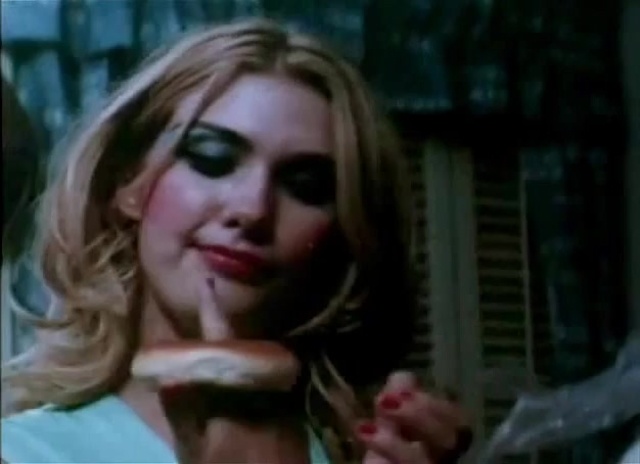
Locke, an Academy Award-nominated actress going into Death Game, became more famous afterwards for her long relationship with Clint Eastwood and the subsequent legal drama once he changed the locks on their home and moved all her possessions into storage. Among her most notorious career achievements was inadvertently getting Philip Kaufman fired off The Outlaw Josey Wales (he was hitting on her and Clint didn't like it) and for directing and starring in the 1986 fable Ratboy, for which she received her second Razzie nomination for Worst Actress* (she lost to Madonna). In her book, she remembers once seeing Death Game play on the Z Channel.
Locke hasn't worked on a film since 2000. Her filmography was blank until this year, when IMDb listed her as an executive producer on Eli Roth's Knock Knock. Actually... Traynor is also credited as executive producer. So is Death Game producer Larry Spiegel, whose last feature producing credit was Michael Cimino's The Sunchaser in 1996. And Colleen Camp, who has a small role in the film, is credited as producer. What the hell is going on here??
I had heard Roth had directed a movie called Knock Knock, but hadn't heard anything about it. All the Roth-related news has been about the distribution difficulties of Green Inferno, which I couldn't get excited about since I don't like Cannibal Holocaust and Roth's been on the outs with me ever since the abysmal Aftershock. But this is the plot for Knock Knock, according to IMDb: "When a devoted husband and father is left home alone for the weekend, two stranded young women unexpectedly knock on his door for help. What starts out as a kind gesture results in a dangerous seduction and a deadly game of cat and mouse." What the-??
It turns out that Knock Knock is apparently a remake of Death Game, with Keanu Reeves stepping into the Seymour Cassel role. And it was just released earlier this month... how weird is that? Roth's film, which debuted at Sundance at the beginning of the year and got scooped up by Lionsgate, doesn't credit the original script by one-time writers Anthony Overman and Michael Ronald Ross and, as far as I can tell, hasn't been formally announced as a remake outside of Traynor, Spiegel, Locke and Camp getting their names on the film (c'mon Roth, no credit for Michael Kalmansohn, the delivery boy?) Nobody's going to believe me, but I swear Death Game's been on the backburner as the next Video Oddity for well over a year, and my just getting around to it the exact same month that an under-sold remake got a theatrical release is a bizarre coincidence. Man, that's just... weird.
Something else weird: Sissy Spacek and Bill Paxton are credited as set dressers in the credits. I'm not surprised about Paxton, who worked behind the scenes for seveal years before moving into recognizable roles in the 80's. But I am surprised that Spacek (whose only other "set dresser" credit was for Phantom of the Paradise in 1974) would be working in the art department after scoring prominent roles in Prime Cut (1972) and Badlands (1973). And Carrie ended up being released a year before Death Game. Wasn't she famous already? (Is it a connection with cast members? She never worked with Locke that I can tell, and she and Camp didn't appear in a movie together until Four Christmases in 2008.)
Oh ok, here's your answer: Jack Fisk was production designer on Death Game. He and Spacek met on Badlands and have been together ever since. Fisk went on to become the go-to production designer for Terrence Malick, worked with former school chum/housemate/brother-in-law David Lynch (including The Straight Story, which starred Spacek) and directed his wife in a movie called Raggedy Man. He was designer on this film and Phantom of Paradise, I guess in both cases Spacek was just a convenient member of his crew. Possibly De Palma even noticed her hanging curtains in the Swan studio set one day and thought, now she'd make a decent Carrie White.
Anyway, sorry about that "boring set design" comment, Jack. But just as Robert A. Burns left his A-game at home working as art director on Microwave Massacre, this one should not go on the reel.
The interminable "Good Old Dad" was performed by the Ron Hicklin Singers, a group of Los Angeles session singers most famous for providing the "Bat-maaaaaan!" part of the old Batman TV series and background vocals for the Partridge Family. The group's lead tenors (John Bahler, Tom Bahler and Ron Hicklin) sang "Suicide is Painless" for Robert Altman's M*A*S*H. Death Game's other ubiquitous number "We're Home" was performed by Maxine Weldon, a soul & jazz artist from the early 70's.
My wife was going to write a review of Ratboy to go with this article, but when the time came she realized she'd committed herself to writing a review of Ratboy and reasonably rescinded the offer. In her book, Locke blames Eastwood's undermining of her efforts on Ratboy's failure. You know, rather than the fact that it was a movie called Ratboy about a rodent-like kid starring Sondra Locke.
Despite having a bad time on this production, Seymour Cassel's career has enjoyed a successful late second act thanks to Alexandre Rockwell, Wes Anderson and Artie Lange.
I guess I'll have to see Knock Knock? It's just hard to imagine Keanu Reeves - Johnny Utah, Neo, John Wick himself - getting involved in a death game where everybody else doesn't end up dead.
~ OCTOBER 22, 2015 ~
COMING SOON...

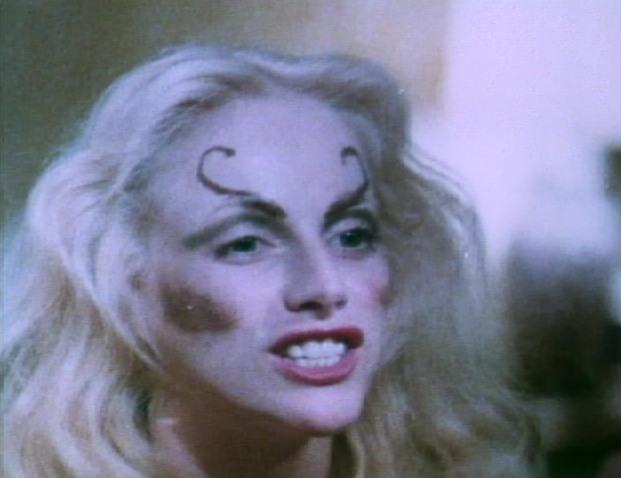
 Man, you know how it is. You're sitting alone at home on a rainy San Francisco night. The wife and kids are out of town so you're just kicking back, listening to some of your favorite records on your impressive stereo system, eating some pizza, enjoying a quiet 40th birthday solo. Then there's a knock at the door - turns out to be two young ladies need to use the phone. They're drenched to the bone and seem harmless enough, so of course you invite them in, get them some towels, feed them hot chocolate, allow them to dry off by the fire and wait for their ride.
Man, you know how it is. You're sitting alone at home on a rainy San Francisco night. The wife and kids are out of town so you're just kicking back, listening to some of your favorite records on your impressive stereo system, eating some pizza, enjoying a quiet 40th birthday solo. Then there's a knock at the door - turns out to be two young ladies need to use the phone. They're drenched to the bone and seem harmless enough, so of course you invite them in, get them some towels, feed them hot chocolate, allow them to dry off by the fire and wait for their ride.

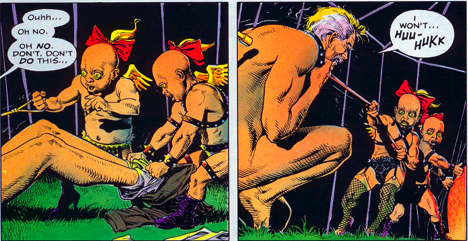
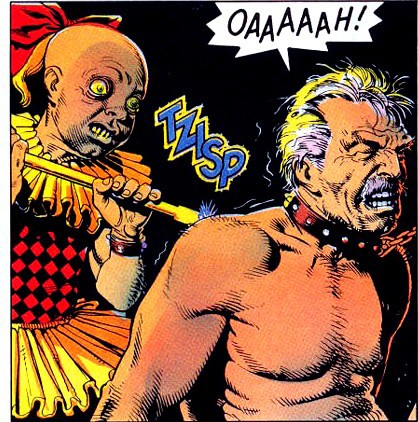
 This may be the first Video Oddities where the addendum might actually be longer than the article itself. I couldn't think of much to say about the film but there's some interesting stuff I found out after watching it, including a really, really strange fluke I only just discovered.
This may be the first Video Oddities where the addendum might actually be longer than the article itself. I couldn't think of much to say about the film but there's some interesting stuff I found out after watching it, including a really, really strange fluke I only just discovered.
